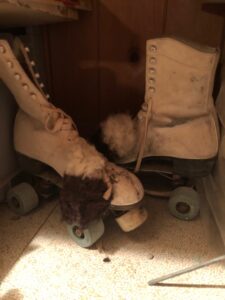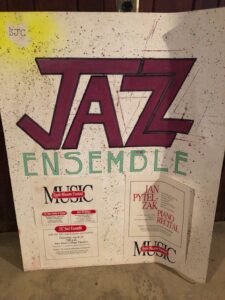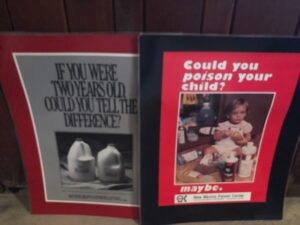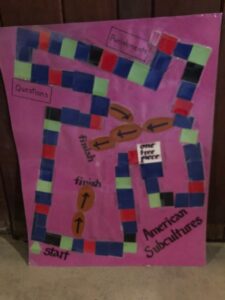I feel like I’ve been oozing stuff for years. I’ve given stuff away, sold stuff, thrown stuff out but stuff seems to leech out of the walls of our home.
I’ve done this whole purging of extra stuff, since I read “Living Simply,” back in the 70s. I have to conclude there are fairies bringing stuff into this house while we sleep. But the stuff looks vaguely familiar when I pull another hoard of it from the crannies of this structure, we call home.
I promise I’m not a hoarder. In fact, I’ve believed that I haven’t kept a lot of stuff over the years. I’m not a collector. Uhm, however a certain someone I’ve lived with for forty years, is. But I’m telling you I’ve purged one closet after another and we still have boatloads of stuff to get rid of.
I’ve been in our basement for what feels like months, peeling away layer after layer of stuff: broken stuff, waiting to be fixed; obsolete stuff threatening to tell on me and reveal how old I really am; and my husband’s stuff that requires just the right turn of the moon to obtain a consultation about whether he needs to keep this and that for another three decades or can I throw it out.
The collection in our basement includes: my white roller skates complete with black and white furry pom-poms with bells on them; 
our first computer, a Mac Plus; 
my first big girl paintings, as opposed to posters – two from a market in San Francisco and one big one from a furniture store in Woodbury, PA – it was a start toward art. 

There is box after box of software for this computer or that; and my “round chair” and brass lamp that I bought at Pier One for my first apartment without rented furniture. 

Yesterday I instituted a household policy about stuff. It goes something like this: if we haven’t unearthed this stuff in twenty or thirty years, it’s time to either fix it, bring it to the surface and appreciate it, or throw it away. Nobody else wants it and apparently, we don’t need it either, thus the long past use-by date.
Our house is relatively compact. And, anyone whose been in our home would say it is usually tidy and uncluttered. So where is this stuff coming from?
Our closets are small. Like most houses of our vintage, there is an attic, a basement, and an attached garage. These are invitingly dangerous, potential “storage” places for stuff. Have you heard the Scripture about building barns for more stuff?
I cleaned out the garage a week or so ago and made massive progress in relieving my life of unused stuff. It’s much improved and growing in efficiency and order. But I’m sadly aware that there remains more to be gone through and too many things semi-hidden, jammed into corners, recesses, over, under, beside or on some such prepositional place (as in all “the things the bunny does”), in that garage.
The attic contains the things of our grown daughter’s early childhood. These are things I will never throw away and she wants, “someday.” The baby Dior onesie, toddler huarache’s, “real” diapers and adorable diaper covers, stuffed-lion rattle, a million stuffed animals, blue sky & cloud crib linens, the Barbie doll house her dad built for her (complete with the dozens of Barbie’s and their necessary accoutrements), and books and more books, etc. My heart melts when I go up there.
The basement stuff is mostly that of my husband’s and my past professional lives, and our daughter’s home-school materials from nearly twenty years ago. There are videos of every performance of my spouse’s jazz bands and percussion ensembles, spanning two or three university careers. I just unearthed huge posters of music festivals we organized, 
charts of the reproductive system
and stages of gestation  from my human sexuality classes that would fit right into the décor of your and my gynecologist/obstetrician’s office;
from my human sexuality classes that would fit right into the décor of your and my gynecologist/obstetrician’s office;
 posters from poison control used at a booth at a health fair my college committee on the environment sponsored
posters from poison control used at a booth at a health fair my college committee on the environment sponsored
; and a board game I created for my American Subcultures class.
and a board game I created for my American Subcultures class.
There are programs and posters from every recital, concert, and musical performance featuring my artistically prolific husband or one of his many ensembles. And books. Don’t get me going on books. I’ve given away so many books. But they grow like weeds in our house. And, these books are from my pre-policy of using the library rather than buying books, for the most part.
Speaking of weeds. I kid you not, I discovered a living, breathing ivy vine thriving through the garage wall. I haven’t yet purged that little sucker because it would involve moving a metal filing cabinet, weighing a ton, full of my spouse’s sheet music collection from his early career as a performing jazz and classical musician. That will have to wait for another more manic clean out, maybe next year.
Speaking of from one year to the next, there are boxes and boxes of CDs from our percussionradio.net venture waiting to find a new home and we’ve got floppy disks, cassette recordings, and CDs from the first titles and every one to this day, in our catalog of hundreds of percussion performance pieces at HoneyRock Publishing.
“What to do, what to do,” chanted Jemima Puddle Duck from Beatrix Potter’s tales, and so said Bev Barton LeVan as she trots up and down the stairs to and from the basement a hundred times a day, some days wearing out my Fit-bit activity-tracker. One thing I am determined to do yet, as this summer dwindles, is get through everything I’ve unearthed in that basement.
I’ve got my work cut out for me, but “stuff,” you listen up, I will conquer you!
